The Tragic Hero of Intellectual Freedom
425 Years Ago, Giordano Bruno was Burned at the Stake

bruno_passion_wimberger1.png
Video collage on the 'Passion Giordano Bruno' (Graphic: Julian Held)
He was the "freest of all freethinkers," writes historian Volker Reinhardt in his widely acclaimed 2024 biography of Bruno, an "intellectual anarchist and nightmare of all guardians of orthodoxy." Exactly 425 years ago today, on February 17, 1600, Giordano Bruno, who considered the universe "infinite" and religious dogmas "asinine," was burned at the stake as a "stubborn heretic."
"Perhaps you pronounce this sentence against me with greater fear than I receive it!": With these words, Giordano Bruno is said to have responded to the fateful verdict of the "Holy Inquisition" on February 8, 1600. Nine days later, the widely traveled, widely praised, but even more widely hated scholar, who had been physically broken by nearly eight years of imprisonment in the dungeons of the Catholic Church, was led to the Campo de' Fiori in Rome and burned at the stake. The image of the crucified Christ, held before him shortly before his death, he rejected with contempt.
It was the consistent end to a consistent life. No other scholar had so radically questioned the intellectual narrow-mindedness of his time and exposed it in its genuine absurdity. The Freiburg historian and Renaissance expert Volker Reinhardt writes in his brilliant Bruno biography "Der nach den Sternen griff" ("He Who Reached for the Stars", translated here for the purposes of this article): "It was only consistent that Bruno, as the only intellectual of his time, was condemned by all established denominations: by the Anglican state church in Oxford, whose representatives threatened him with the initiation of plagiarism proceedings; by the Calvinists in Geneva, where he had to make a degrading apology for his criticism of an incompetent lecturer; in Lutheran Helmstedt, where the chief pastor forbade him from participating in communion; and, most consequentially, by the Catholic Inquisition in Rome, where he was publicly burned as an arch-heretic for the edification of pious pilgrims."
»A Coolly Calculated Judicial Murder«
Some of Bruno’s groundbreaking insights, which so outraged the Christians of his time and seem incredibly "modern" to us today, were older than Christianity itself. Early on, Bruno had read the didactic poem "On the Nature of Things" by Lucretius (97–55 BCE), who in turn had drawn on the already ancient philosophy of the Greek philosopher Epicurus (341–271 BCE). That the world consists of tiny atoms, that the universe is infinite, that there are many inhabited worlds besides Earth, and that religion is organized deception – Epicurus had explained all this nearly two millennia before Bruno. What was new, however, was that Bruno had the courage to publicly proclaim these taboo-breaking insights under the most adverse circumstances, while Epicurus had advised his followers to live "in seclusion" with their untimely worldview.
Of course, Bruno was not merely a disseminator of the Epicurean worldview. He skillfully combined it with the then-new teachings of Copernicus and the progressive theological arguments of Nicholas of Cusa and Erasmus of Rotterdam, which he used against the prevailing religious and secular establishment. However, he concealed this attack so cleverly in the dialogues of his books that the Catholic inquisitors had difficulty finding solid evidence for Bruno's conviction. Ultimately, his death at the stake, according to Bruno biographer Reinhardt, was "a coolly calculated judicial murder," an "example for the pilgrims of the Holy Year," demonstrating that the "Holy Catholic Church" was still capable and willing, even after the Reformation, to issue "harsh and just judgments" against all those who questioned its dogmas.
What the Roman inquisitors could only suspect at the time, Volker Reinhardt has clearly revealed in his detective work on Bruno's life and writings. It becomes evident that Bruno's "bold course through unknown galaxies of thought" was always linked to concrete conclusions that led to the realization "that every type of rule is synonymous with the exploitation of the people and that the church actively supported this abuse of power through its perverted teachings." Reinhardt's conclusion: "Thus, behind the cosmic visionary emerges the political thinker Giordano Bruno, who critically engages with the grievances of his time and arrives at revolutionary conclusions for a more humane society and a fairer state."
Commemorating the Namesake of the Giordano Bruno Foundation
"With his groundbreaking Bruno biography, Volker Reinhardt has not only dispelled numerous misinterpretations but also highlighted the key aspects that motivated us in 2004 to found a new organization under the name 'Giordano Bruno Foundation'," says gbs spokesperson Michael Schmidt-Salomon. "We were criticized several times for this choice of name, but we never regretted it. Giordano Bruno was the great tragic hero of intellectual freedom in European history. He was certainly not a scientist in the modern sense, but a model of uprightness and intellectual integrity. With his courage, his intelligence, and his humor, he paved the way for a more open, dogma-free, and evidence-based debate about God and the world. Moreover, his fate is a reminder to us not to draw the boundaries of tolerance too narrowly. Although we no longer live under the theological dictates of the 16th century, dogmatic restrictions of all kinds still exist – and they have been increasing again for some time! What we can learn from Bruno's tragic life story in this context is the insight that we should value dissenting opinions more highly, for they may contain impulses for a better future."
